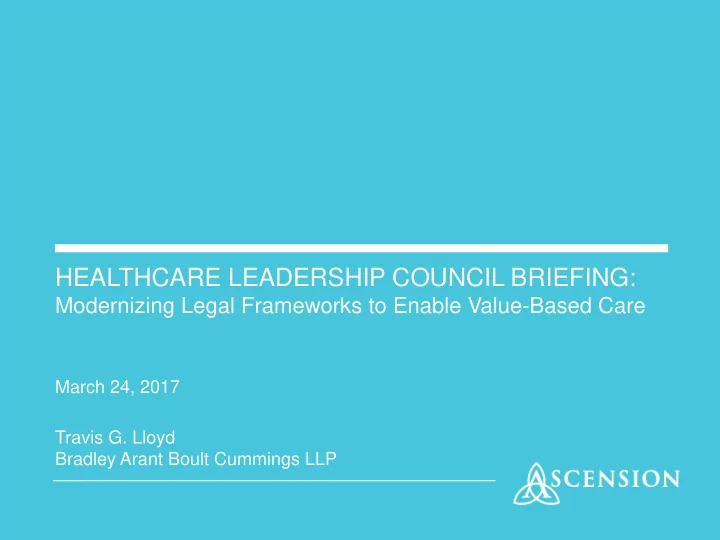

HEALTHCARE LEADERSHIP COUNCIL BRIEFING: Modernizing Legal Frameworks to Enable Value-Based Care March 24, 2017 Travis G. Lloyd Bradley Arant Boult Cummings LLP
About Ascension • Ascension is a faith-based healthcare organization dedicated to transformation through innovation across the continuum of care • Ascension is the largest non-profit health system in the U.S. and the world’s largest Catholic health system, with approximately 2,500 sites of care in 24 states and District of Columbia
CONTINUUM OF CARE SITES HOSPITALS BY TYPE AMBULATORY CARE AND DIAGNOSTICS Acute Care Hospitals 111 Ambulatory Surgery Centers 66 Rehabilitation Hospitals 6 Occupational Health Programs 55 Behavioral Health Hospitals 9 On-Site Employer Clinics 76 Long-Term Acute Care Hospitals 2 Free-Standing Imaging Sites 110 TOTAL 128 Retail Lab Collection Sites 155 Hospitals Not Majority Owned – 13 Primary Care Clinics 565 Joint Venture or Management Agreement Retail Care Clinics 12 SENIOR CARE AND LIVING FACILITIES Retail Pharmacy Sites 45 Assisted Living 15 Continuum of Care Retirement Sleep Centers 31 8 Communities Specialty Clinics 613 Independent Living 2 Virtual Care Programs 70 Long Term Acute Care/Skilled Nursing 23 EMERGENCY SERVICES Multi-Service Line Communities 7 Free-Standing ER Other Senior Living (HUD, Other) 2 74 and Urgent Care Sites 2,500 PACE Programs 3 Emergency Medical 21 Sites of Care Services (EMS) POST ACUTE SERVICE SITES COMMUNITY SERVICES Durable Medical Equipment 15 Community Health Centers 16 Home Health Services 42 Dispensary of Hope Sites 9 Hospice Services 16 Mobile Clinical Services 26 Outpatient Rehabilitation Centers 148 Wellness Centers 23 3 Community/Social Programs 157
Facts and Stats • $1.8 billion in care of persons living in poverty and other community benefit programs • 23,657,773 outpatient visits (excluding ER visits) • 11,159,811 physician office visits • 3,007,923 emergency visits • 1,527,543 clinic visits • 1,597,177 equivalent discharges • 777,593 discharges • 505,361 home health visits • 316,804 observation days • 151,000 associates • 84,751 births • 22,990 available beds • 36,000 aligned providers *Data for FY2016 4 March 24, 2017
CARE DELIVERY MAP 5 1-6-17
Evolving Payment Landscape • Public and private payers are increasingly tying payment to value, not volume, in an effort to achieve quality outcomes, clinical efficiencies, and cost savings • Congress has created alternative payment models, such as the Medicare Shared Savings Program, and has authorized HHS to create other models as demonstration programs • New payment models demand teamwork among health care providers—accountability, shared goals, and aligned incentives • Yet, the Stark Law and Anti-Kickback Statute are built for a fee- for-service or volume-based world, where providers are “siloed” and any financial relationship between them may be problematic
Legal Barriers • Implementation of value-based payment models has been possible only because Congress has authorized, and HHS has issued, narrowly tailored regulatory waivers of fraud and abuse laws • Current regulatory waivers are helpful, but result in a patchwork approach that limits providers’ ability to provide consistent, uniform incentives across all patient populations • Consequences of potential noncompliance with the Stark Law and Anti-Kickback Statute are dire, potentially discouraging providers from entering into innovative arrangements that would improve quality outcomes, clinical efficiencies, and cost savings
Legal Barriers • Examples: - Care coordination arrangements involving remuneration (in cash or in kind) to physicians and non-physician practitioners for playing key roles in managing patient care and adhering to care pathways - Post-acute support arrangements through which hospitals provide support to post-acute providers to implement plans of care - Programs through which providers provide post-discharge support to patients to promote patient engagement and improve quality outcomes - Arrangements through which hospitals subsidize shared health IT infrastructure used by providers
Recommendations • The Stark Law and Anti-Kickback Statute should be updated to provide clear and comprehensive protection for value-based payment arrangements that do not pose undue risk of fraud and abuse • Some suggestions for reform: - Extend waivers to all payers, not just CMS-run programs, and grant HHS broader authority to create regulatory waivers - Create new exceptions and safe harbors for care coordination arrangements - Clarify key standards found in many Stark Law exceptions and Anti- Kickback Statute safe harbors (e.g., fair market value, commercial reasonableness, volume or value standard)
Recommend
More recommend